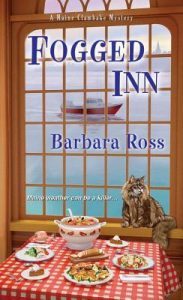Kathy Lynn Emerson's Blog, page 52
February 8, 2017
The Best, Most Amazing, Awesomest, Bigliest Book Readings Anywhere. Trust Me.
Now that I have your attention….
On the first Saturday of every month in Westbrook, we invite two local authors (one fiction, one nonfiction) to read from their works and take a few questions. It’s called Books in the Brook, which is clearly the best, most amazing, awesomest, bigliest name for a book reading anywhere. (BTW, spell check does not like these words. I have red squiggly lines all over the text.) Check it out. Books in the Brook
Fellow Maine Crime Writer Brenda Buchanan and I started Books in the Brook along with fellow Maine author Laura Kilmartin and Mary Brooking, owner of The Continuum for Creativity, the art studio that hosts Books in the Brook.
Some of the authors have included fellow Maine Crime Writers Bruce Coffin and Chris Holm. Dick Cass will be there in March.
This past Saturday, we had an incredibly stimulating reading and discussion by Bryan Wiggins and Elizabeth De Wolfe. Not only did we hear some wonderful writing, but we learned how 19th century America treated ambitious women from Elizabeth and how a peripheral approach can help deal with profound personal loss from Bryan.
Not a bad way to spend an hour.
It is always extremely interesting and entertaining. And you’re surrounded by art. And you’re in Westbrook!
So, Books in the Brook, at 4 p.m. on the first Saturday of the month.
Check it out.
If you don’t…well, in the words of our president: Sad.

An Unbeaten Man
by Brendan Rielly
February 7, 2017
The Seafarer Inn
Many of you already know that we lost my mother-in-law on January 27th. Here is her obituary in the Boothbay Register. The dedication in Fogged Inn, the fourth Maine Clambake Mystery, reads:
This book is dedicated to my mother-in-law, Olga Carito, the incredible proprietor of the Seafarer Inn, and the person who introduced me to Boothbay Harbor, Maine.
A life-long reader with wide tastes, Olga loved that Fogged Inn was dedicated to her. In her honor, I’m rerunning a previous post I wrote about Olga, the Seafarer, and some of her guests.
++++
I’ve just returned from 10 days at the Seafarer Inn in Boothbay Harbor, Maine. Sitting in one of the rocking chairs on the Inn’s wide front porch watching the sailboats glide across the harbor is one of my favorite things in the world.

The Seafarer Inn
Your hostess at the Inn is my mother-in-law, Olga. Ignore the first name, which came from a novel her mother favored in the 1920s. Her maiden name, DiIanni, is much more meaningful. Like the Marchmains of Brideshead, the DiIannis of Olga’s generation are cursed with a dangerous charm, albeit in a version I like to think of as “Marchmain lite”—without the grandeur, but also with far less alcohol.
For almost 15 years, Olga has put the DiIanni charm to good use running The Seafarer as a Bed & Breakfast Inn. Often have a reserved mid-western couple hoping for a quiet night in Boothbay been surprised, after the communal breakfast and ritual picture taking, to find themselves enthusiastically hugging and kissing Olga good-bye on the big front porch, promising to come again.
Some guests go even further. Olga has a small but fanatical following who seem to like nothing better than to come, stay for several days, and do her chores for her. These guests arrive every year to wash the lawn furniture, pull the weeds, hang pictures and do other rounds of endless activity and then pay her for the privilege.
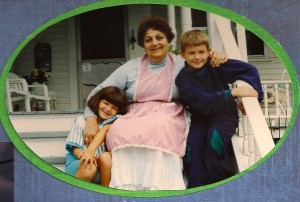
My mother-in-law Olga and my kids on the front porch of the Seafarer. 1990
We, her children, have wondered about this for some time. Appropriate to its architecture, The Seafarer is decorated in the Victorian manner, which is to say that every available surface, either horizontal or vertical, is covered with—something. We gave up moving any of this stuff around long ago (except occasionally to clear off a chair so we can sit down), because we found that liberating any space at all only created an invitation to fill it up again. Therefore, we have often been mystified by the sudden appearance something like a heavy bureau in a third floor bedroom.
“Picked it up at the dump,” my mother-in-law will proudly explain. “Solid mahogany. Can you imagine someone getting rid something like this?”
“Perhaps it was someone who already had three or four bureaus per bedroom,” my husband will suggest, gazing around meaningfully.
“How does she even get this stuff in here?” he would hiss soon as she was out of earshot, imagining house elves or magic mice.
“I think,” I answered, “It’s the damn guests.”
My suspicions were initially aroused when I answered the phone at the Inn one day. “Hi,” proclaimed the chipper voice at the other end. “It’s Steve. I was just calling to make my reservation.”
“When did you want to come, Steve?” I asked.
“Second week in October, the same as always.” Steve seemed a little offended that I wasn’t aware of this. “I come every year to see the foliage and put up the storm windows.”

The Harbor
This year, I finally got the chance to catch the action first hand. While I was staying at the Inn, Al, Marsha and Miles O’Brien arrived from Peabody, Mass., for a two night stay. Olga actually closed the Inn two summers ago, but that has not stopped the most fanatical of the chore-doers from coming, even though now the place is now 100% amenity-less. For these people, making your own bed and breakfast at the Bed & Breakfast only adds to the appeal. I have to say that on the surface the O’Briens seemed like perfectly normal—even nice–people, though Miles was perhaps a bit more polite than the average adolescent dragged off to a Bed & Breakfast with no TV or internet by his well-meaning but clueless parents.
The minute they arrived, Al huddled with Olga about the to-do list. They inspected the property. He had ideas. Of course, so did she.
“Time for bed,” Al announced to his family immediately following dinner on the first night with all the anticipation normally reserved for a fishing trip or a cruise to Monhegan. “The hardware store opens at 6:00 a.m.!”
I came down the next morning to find Olga in the kitchen. “Where are Al and Marsha?” I asked.
“Marsha ran to the supermarket and Al is trimming the bushes,” she answered showing absolutely no awareness that these are not vacation activities–are, in fact, the very activities that most people go to a Bed & Breakfast to get away from.

The view from my rocker (look familiar?)
As I sat on the porch, sipping coffee and gazing at the boats in the harbor and occasionally at Al doing his Edward Scissorhands impression in the hedge, I thought I had the answer. “Ah,” I thought, “Al is one of those men who don’t know how to relax, who think puttering equals recreation.”
But Marsha put that notion to rest as soon as she returned. “I can’t get him to do a thing at home,” she said, gazing fondly at her husband who was sweating profusely while tangoing with a winsome rhododendron. “I have a to-do list and I have begged him and begged him to do just one thing on it.”
“Don’t you have to make your own bed in rehab?” my daughter Kate asked a little later. She was sitting in the rocker next to mine, painting her toenails and staring at Al, who appeared to be covered in small cuts, and, along with his hedge-clippers, was now so entangled in a lilac bush he looked like he was battling a giant squid. Kate’s furrowed brow told me she, too, was trying to understand the O’Briens.
“Yeah,” I answered, “but I think that only does something for people who are so addled they can’t make their beds at home.”
That night, Marsha reminisced at dinner. “The first time we came here was the week you opened. We were on our honeymoon. I helped you hang the curtains in the living room.”
“Is that so?” Olga replied politely.
Frankly, Marsha seemed a little hurt that Olga couldn’t remember this, but really, so many guests, so many chores…
Later, we looked at through the photo albums (assembled by guest Jeanine Weinstein, 1994-2002) trying to find pictures of the O’Briens on that fateful visit. We came up empty, though we did find snaps of the year they stained the deck.
 I never did unlock the mystery of why people come to work and pay money to Olga for the privilege. Maybe it’s that deadly DiIanni charm. Or maybe their parents live far away, or are gone, and these guests want to remember what it’s like to spend a weekend doing annoying tasks with poor tools and an irritating level of supervision. Or maybe they want not so much rehab as “hab,” that feeling of satisfaction that comes from helping someone who needs the skills you have and the time you can give, and who provides friendship and connection in return.
I never did unlock the mystery of why people come to work and pay money to Olga for the privilege. Maybe it’s that deadly DiIanni charm. Or maybe their parents live far away, or are gone, and these guests want to remember what it’s like to spend a weekend doing annoying tasks with poor tools and an irritating level of supervision. Or maybe they want not so much rehab as “hab,” that feeling of satisfaction that comes from helping someone who needs the skills you have and the time you can give, and who provides friendship and connection in return.
February 6, 2017
May Sarton … Inspiration
I hardly ever sit still without being haunted by the “undone.” I often feel exhausted, but it isn’t my work that tires (work is rest); it is the effort of pushing away the lives and needs of others before I can come to the work with any freshness and zest.
No — I didn’t write that, although those words spoke to me. I copied them into a notebook I kept 25-30 years ago and filled with inspiring quotations about writing, or life.[image error]
The woman (you guessed it was a woman, right?) who wrote those words was poet, novelist and memoirist May Sarton (1912-1995) in her Journal of a Solitude (1973).
For those of you who don’t know Sarton and her work: She was born in Belgium, and immigrated with her family to the United States in 1914, when German troops invaded Belgium during World War I. Her father was a science historian who worked at Harvard; her mother was an artist. May studied acting and writing, and her first collection of poetry was published in 1937.
Her poetry and novels and memoirs all circle around (and often strike deep at the heart of) love. Love of friends, love of country, love of nature, and lost loves. In Sarton’s case, she and her lovers were lesbian. But her books have universal appeal. I loved her novels, but especially treasured her memoirs, which she wrote after she moved to York, Maine. She wrote of being alone, of growing old, of publishing chores as well as joys, and of gardening and nature, which restored her.
It is never a waste of time to be outdoors, and never a waste of time to lie down and rest even for a couple of hours. It is then that images float up and then that I plan my work. But it is a waste of time to see people who have only a social surface to show.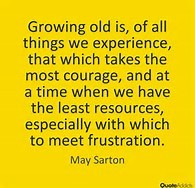
Sarton’s words spoke to me at a time in my life when I felt depressed and overwhelmed by family and corporate obligations, and was struggling to write fiction. I dreamed of moving to Maine, and having hours to write. I’d been a strategic planner for a corporation; now I was planning my future, making seemingly endless lists of what I needed to do, financially, in my home, emotionally, to make the move I desperately needed. To prepare my daughters to be independent. To care for my mother, who I knew would come with me. To eventually re-learn living alone, which I hadn’t done since my twenties.
Loving someone means helping them to be more themselves, which can be different from being what you’d like them to be, although often they turn out the same.
Through her memoirs I saw May Sarton struggling with the physical world. Chipmunks dug up her daffodil bulbs; her back ached when she worked in the garden she loved; reading to audiences across the country exhausted her. I saw her balancing her grief when her favorite cat killed one of the birds in her yard that had delighted her. I felt her tears as she remembered past relationships that, she admitted, she had not handled well, and therefore lost. I wondered with her who would drive her to the hospital, if she should become ill. I rejoiced with her at summer days, and envied her habit of drinking champagne every afternoon.
Because if not now, then when?
May Sarton had a stroke in 1990, and required a nurse. She could no longer garden, or walk with her cherished dog to the sea. But she still loved the coast of Maine, and her home, and, when she could, she continued to write. She dictated her final journals. She still drank champagne in the afternoon.
She died of breast cancer in 1995, three years before I moved full-time to Maine.
Shortly after I settled my mother and I into my family’s home near the Sheepscot River, I read in a local newspaper that the content of Sarton’s home (except for her literary work, which was deeded to a library) was being auctioned. My mother was ill; I couldn’t attend. But I smiled as I read a listing of what she had left, and saw it included an untouched case of champagne.
She never deprived herself of what brought her joy. She had a life well-lived. An example to me, and I believe, to all of us.
February 5, 2017
Lies, Damn Lies, and Alternative Facts
“Writers are liars, my dear, surely you know that by now? And yet, things need not have happened to be true. Tales and dreams are the shadow-truths that will endure when mere facts are dust and ashes, and forgot.” –Neil Gaiman
I hear this idea a lot from people, that fiction writers are all liars and that therefore we have it easy because we just make things up. And it’s hard in the current climate not to think about truth and lies and facts and alternative facts (whatever that means). But acknowledging something is a lie implies there are facts, that there is truth, a view of the world or a situation or a person that we can, if we don’t agree on it, recognize it as factual. (Maybe she meant counterfactual facts.)
Read Ursula Le Guin on alternative facts.

Writers lie for these reasons: to entertain, to instruct, to display, to explain the world as they see it. What a writer cannot do, and what our esteemed—and steamed-up—chief executive is doing, is create stories from a vacuum, from unprovable assertions, unrecognizable emotions, and unbelievable characteristics. What writers are required to provide in their lies is verisimilitude—the art of being believable.
I write, in Solo Act and in other places, about the city of Boston and it is my Boston. Sometimes I add a street where there is none, sometimes I describe the city as it was in 1969 and sometimes as it is in 2017. But I’m very careful not to put a 14,000 foot mountain within sight of downtown or set the Pacific Ocean on the city’s west flank.
There’s sometimes a tendency in fiction to go the other way, to overspecify and hew to a line of accuracy that would torture a research librarian. It’s one of the reasons I find it so hard to read someone like Tom Clancy, who is specific about the armaments and vehicles practically down to the millimetric measurements of the wheel nuts. It feels a foolish consistency and obscures the fact that the characters are so thin. For the interesting lies are all about characters, people, not the caliber of a machine gun.
On the other hand, I do cross my own line. In my latest novel, Hide the Cat, a character talks about wanting to visit the Uffizi. In Rome.  Leaving aside the question of whether I knew the Uffizi was in Florence, two people came up to me after a recent reading to correct the story. But both of them, in different ways, understood that I might have put that misunderstanding into a character’s mouth as a way of displaying her ignorance or her innocence about other parts of the world.
Leaving aside the question of whether I knew the Uffizi was in Florence, two people came up to me after a recent reading to correct the story. But both of them, in different ways, understood that I might have put that misunderstanding into a character’s mouth as a way of displaying her ignorance or her innocence about other parts of the world.
For people writing crime fiction, the insistence on accuracy over verisimilitude quite often revolves around firearms. I know more than one crime writer who’s gotten a message from a reader to the effect that “Well you know your guns, so you must be all right.” Elmore Leonard famously had a character in one book click off the safety on a revolver, thereby generating all kinds of fervent commentary.  He should have known that his readership, Westerns and thrillers alike, would comprise a disproportionate number of gun aficionados. And he never made a similar mistake again, hiring a retired Florida law enforcement official to read his drafts for firearm accuracy. (At least I think that’s the story—I could be lying.)
He should have known that his readership, Westerns and thrillers alike, would comprise a disproportionate number of gun aficionados. And he never made a similar mistake again, hiring a retired Florida law enforcement official to read his drafts for firearm accuracy. (At least I think that’s the story—I could be lying.)
So, my point? Sure, sweat the details. But the whole damn story is big lie anyway. And what’s the mark of a good liar? That you believe him (or her). No amount of attention to detail, for example, will overcome a tendency to put people into situations their characters wouldn’t take on or transgress the laws of physics (unless you’re writing science fiction). And even then, you’d better make it believable. The last thing a reader wants is to mistrust you.
Of course we’re liars, for goodness’ sake—we’re making stories up. But our lies don’t hurt people, deny them humanity or basic rights, try to set a 14,000 foot mountain in the middle of Boston Common. We want to be good liars: good in the sense of competence, that our lies are believable, and good in the sense that our motives are clean. We are not lying to you for any other reason than to entertain. We are trying to give you something, not take away.
February 3, 2017
Weekend Update: February 4-5, 2017
 Next week at Maine Crime Writers, there will be posts by Dick Cass (Monday) Lea Wait (Tuesday), Barb Ross (Wednesday), Brendan Rielly (Thursday) and Maureen Milliken (Friday).
Next week at Maine Crime Writers, there will be posts by Dick Cass (Monday) Lea Wait (Tuesday), Barb Ross (Wednesday), Brendan Rielly (Thursday) and Maureen Milliken (Friday).
In the news department, here’s what’s happening with some of us who blog regularly at Maine Crime Writers:
An invitation to readers of this blog: Do you have news relating to Maine, Crime, or Writing? We’d love to hear from you. Just comment below to share.
And a reminder: If your library, school, or organization is looking for a speaker, we are often available to talk about the writing process, research, where we get our ideas, and other mysteries of the business. Contact Kate Flora
February 2, 2017
Bright Lights! Red Carpet!
By Brenda Buchanan
Nine wonderful actors brought the work of five Maine crime writers to life Monday night in front of a nearly-full house at Portland Stage Company.
It was an absolute blast, the tonic we all needed on a cold January night.
Scenes from my first Joe Gale book, Quick Pivot, Gerry Boyle’s Straw Man, Paul Doiron’s The Poacher’s Son, Julia Spencer-Fleming’s One Was A Soldier and Chris Holm’s entire short story Eight Pounds were given staged readings by an enthusiastic and talented troupe of actors.

The marvelous actors. Andrew Harris standing, and seated, left to right, Bess Welden, Courtney Cook, Whip Hubley, Ross Cowan, Elizabeth Freeman, Daniel Noel, Christopher Davis and Hannah Cordes. The set in the background is for Arsenic and Old Lace, PSC’s current mainstage production.
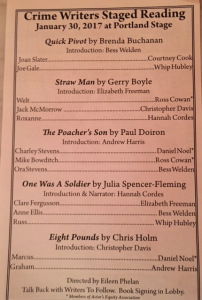
The program. A keepsake, for sure.
Several of the actors are professionals—members of Actor’s Equity Association—who are Portland Stage Affiliate Artists. The others possess impressive resumés from their work at Portland Stage and other area theaters. To a person, they did a superb job.
Julia, who studied theater as an undergraduate, observed after the performances that a staged reading is a true test of an actor’s chops. Without costumes, props or sets, the audience is fully focused on the actors and their ability to inhabit the characters. And inhabit they did.
In the case of Quick Pivot, Whip Hubley became dogged newspaper reporter Joe Gale and Courtney Cook really got into the skin of Joan Slater, the wistful former lover of Joe’s late mentor, Paulie Finnegan.
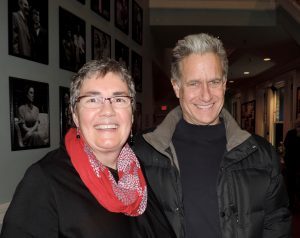
Yours truly with Actor Whip Hubley, who read the parts of both my newspaper reporter protagonist Joe Gale and Julia’s police chief Russ Van Alstyne during the staged readings.
I can’t even describe the thrill I felt when the actors read the words I’d written, and how rewarding it was to hear the audience react. It was equally exciting to watch the actors perform passages written by Gerry, Paul, Julia and Chris, four writers I hold in the highest regard.
As writers, the task of preparing scenes for submission was a lesson on the difference between writing for readers and writing for performers. We were asked to submit two or three 10-minute-long, dialogue-heavy passages for the director’s consideration, each with two or three characters. The work needed to be adapted for the stage by trimming out the words, phrases and sentences that would bog down the dialogue. It was a bit of a challenge to adopt a different mind-set, but the payoff was tremendous.

Left to right, Paul Doiron, Julia Spencer-Fleming, Chris Holm, me and Gerry Boyle.
Enormous thanks go to Director Eileen Phelan, who proposed the idea of staged readings back in November. Her discerning choice of scenes and skill matching actors to parts was critical to the evening’s success.

Chris Holm had us all cracking up during the post-performance discussion with the audience.
Bess Welden of Portland Stage, who acted in Paul’s and Julia’s scenes, also did a great job moderating the post-performance discussion with the enthusiastic and engaged audience.
This was the second collaboration between local crime writers and Portland Stage. Last year several authors took part in an audience talk-back after a production of PSC’s The Hound of the Baskervilles. This week’s staged readings took the relationship a step further, and there’s already talk about doing it again next year so more crime writers can experience the thrill of watching their characters come to life on stage.
Bright lights, red carpet? Bring it on!

Groundhog Day
Bruce Robert Coffin here at the helm of Maine Crime Writers, wishing all of you a very happy Groundhog Day. Hopefully, Punxsutawney Phil, that most celebrated of weather prognosticators, will see nary a hint of his shadow today, that we may be whisked away toward a much needed and early spring.
Speaking of spring, Malice Domestic is right around the corner and I wanted to take a moment to congratulate three members of our MCW family, Kate Flora, Jessie Crockett, and Barb Ross, for well-deserved Agatha nominations. Kate received a best non-fiction nom for Good Man and a Dog (with retired Maine Game Warden Roger Guay), Jessie’s nom was best historical for her novel Whispers Beyond the Veil, and Barb received a best contemporary nom for Fogged Inn. Congratulations to all!
By now you’re probably wondering what any of this has to do with crime fiction or Groundhog Day. Well, I’ll tell you. Last Thursday, whilst drowning my sorrows in coffee and corned beef at a local haunt, I starting thinking about my scheduled MCW blog date of February 2nd and about how the more things change the more the stay the same. Naturally, as all mystery authors are prone to do, my mind drifted into the lives of Phil, his wife Phyllis, and their only daughter Phelicia. And I wondered what kind of mischief might arise that would throw their sleepy little hamlet at Gobbler’s Knob into chaos. Bam! I had it. What if Philippe, philanthropist and patent holder for tiny little marmot crampons, and owner of Blizzards, a local outfitter specializing in winter gear, decided to force Phil’s hand? What if Philippe wanted Phil to see his shadow, forever locking him in some Murray-esque perpetual loop, living out the rest of his days on February 2nd? To what depths might he stoop to to keep the season alive and profits soaring? Blackmail? Kidnapping? Murder?
Maybe Philippe would enlist the help of Philbert, a top hat and tuxedo wearing member of the Inner Circle and one of Phil’s most trusted advisors, to kidnap the lovely Phelicia and hold her for ransom. Who would come to the rescue? Perhaps Philomina, Philbert’s wife, who once dated Phil and still holds out hope that they will one day be together, slips a pill into phyllo dough while preparing pastry for Philippe and Philbert. But what would become of Phyllis?
A plot so twisted it’s guaranteed to make Hank Phillippi Ryan envious. I’ll bet you’re wondering what I might title such a literary masterpiece. How about Phive O’Clock Shadow…?
Happy Groundhog Day, everyone! Wishing you all an early spring.
January 31, 2017
Another Malden Man Update
Kate Flora again. Forgot, when filling in for Dorothy, that I was supposed to blog today.

A sunfish, about which you will learn more anon…
So, being pressed for time, I am revisiting an earlier post on the life of Malden Man, with some updates on his current behaviors.
Some time back, seeking an escape from writing about writing, I indulged myself in a humorous post I’d always wanted to write. It involved the elusive “Malden Man” and his adventures, misadventures, and the many lives he’s led. So here is the original post, with some updates about what he’s been doing since last we explored his checkered career.
As you all well known, crime writers are constantly scanning the papers, looking for ideas, and this keeps popping up. I’ve always wanted to write this blog.
The Urban Dictionary describes Malden Man thusly:
Malden Man
A very handsome, well educated, erudite man. Usually of Middle Eastern and/ or Mediterranean descent. The Malden Man is very cosmopolitan, well read, articulate, smokes, speaks at least three languages fluently and will either have a Ph.D. from MIT or an MBA from Northeastern University. He is often married and faithful to his wife despite being a wicked flirt. If he is single take a ticket and queue up girls he will have more groupies than Mick Jagger ca. 1968 and Brad Pitt combined.
The facts, however, do not bear this out.
Years ago, when I met my husband Ken, he remarked that one of the Harvard papers–he can’t recall whether it was The Crimson or The Lampoon–once observed that the Boston papers were so provincial that a local headline would read, “Malden Man Killed in New York Nuclear Holocaust.” Malden Man sounded like a neanderthal creature to me. He stuck in my mind, and I’ve been following his adventures ever since.
I used to have a whole file of Malden Man clippings, but I’ve changed desks and offices so many times that my Malden Man collection has disappeared. Among those lost clippings were some that proved the point about Boston’s provincial papers, including “Malden Man Found Alive in Grand Canyon” and a charming story reporting that Malden Man had been injured by a falling chimney during a Los Angeles earthquake. Despite that missing file, I still have a sheet of paper on which I have recorded some of the poor fellow’s ups and downs. Malden Man, it seems, does not have a very good character. Over the years, he’s had a steady stream of run-ins with the law. The Boston Strangler, Albert De Salvo, was a Malden Man. While out hunting, Malden Man shot at what he thought was a turkey and accidentally hit a father and a son who were also hunting. He’s been convicted for illegally importing elephant ivory. And perhaps most dreadful of all, a Boston news source reports:
Malden man (not shown above) dressed as Santa Claus was arrested on charges of disorderly  conduct after police said he repeatedly dropped his costume’s pants in front of shoppers at a busy mall in Salem, N.H.
conduct after police said he repeatedly dropped his costume’s pants in front of shoppers at a busy mall in Salem, N.H.
 He has not been a lucky man, either. Over the years, according to The Boston Globe, Malden Man (who has more lives than a cat) has fallen 45 feet to his death, had a stiletto plunged into him, has been shot thrice in a fight, been bitten by a dog, been nabbed for liquor cargo and had his car seized by the border patrol. He was arrested in the West after eloping, claims that his bride left him after five minutes, has entered the priesthood, and reported his wife kidnapped in Northern Maine. He’s also bested a robber in a scuffle, picked a lock and escaped in Portland, Maine, and needed the assistance of Boston’s Mayor Curley to get him released from jail in Cork.He has been injured at work, fallen from a car and lost an arm before being killed by a train in Nova Scotia, dying after a hold-up, and drowning after swimming in a Medford pond.
He has not been a lucky man, either. Over the years, according to The Boston Globe, Malden Man (who has more lives than a cat) has fallen 45 feet to his death, had a stiletto plunged into him, has been shot thrice in a fight, been bitten by a dog, been nabbed for liquor cargo and had his car seized by the border patrol. He was arrested in the West after eloping, claims that his bride left him after five minutes, has entered the priesthood, and reported his wife kidnapped in Northern Maine. He’s also bested a robber in a scuffle, picked a lock and escaped in Portland, Maine, and needed the assistance of Boston’s Mayor Curley to get him released from jail in Cork.He has been injured at work, fallen from a car and lost an arm before being killed by a train in Nova Scotia, dying after a hold-up, and drowning after swimming in a Medford pond.
But Malden Man is not all bad. He reportedly adopted 17,000 Armenian waifs. Was put in charge of a Greenland expedition, made a notable sea trip, was given local honors, and acted as interpreter after a plane hijacking. The generous soul once bought a house as a surprise for his parents, only to have them refuse to move into it, and donated part of his liver to save his son. It is reported that he, himself, lived in a tent.
He’s a courageous fellow, too. Over the years he has bested a robber in a scuffle, beaten off four assailants, survived an unprovoked attack in which he was stabbed in the back by an elderly woman. And he escaped with his life, and without serious injury, after spending the night alone on a rugged New Hampshire mountain.
Perhaps most notable, for those of us who write mysteries, is his “brush with evil.” According to the Boston Herald, it seems that: “Malden 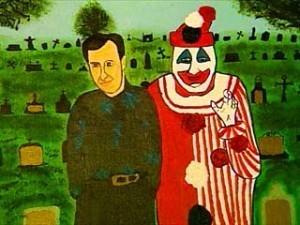 Man’s guilty pleasure in investing in murderabilia has come back to haunt him thanks to a ‘cursed’ clown painting by serial killer John Wayne Gacy, which the collector claims turned his life into a three-ring circus.” According to Malden musician Nikki Stone, since he plunked down $3,000 in 2001 to buy the framed oil from national murderabilia merchant Arthur Rosenblatt, Stone said his beloved dog has died and his mother found out she had cancer. When a friend offered to store the painting at his house, the friend’s neighbor was killed in a car crash. A second friend who kept the painting for Stone attempted suicide, Stone said.
Man’s guilty pleasure in investing in murderabilia has come back to haunt him thanks to a ‘cursed’ clown painting by serial killer John Wayne Gacy, which the collector claims turned his life into a three-ring circus.” According to Malden musician Nikki Stone, since he plunked down $3,000 in 2001 to buy the framed oil from national murderabilia merchant Arthur Rosenblatt, Stone said his beloved dog has died and his mother found out she had cancer. When a friend offered to store the painting at his house, the friend’s neighbor was killed in a car crash. A second friend who kept the painting for Stone attempted suicide, Stone said.
Malden Man no longer has the painting.
Since this posting, Malden Man has died in an accident, and, evidently resurrected, nearly been killed by a lightning strike. More recently, like the cat that has nine lives, he survived a night in the woods after an ATV accident by crawling for hours to find help.
Despite the many times he’s died and been revived, his life of crime continues unabated. He’s been charged with fraud for claiming to mentor behaviorally challenged youth, writing details reports of taking them trick or treating and Christmas shopping while not actually meeting with them at all. Maybe he was too busy fighting a gun charge, being charged with cocaine distribution, and committing securities fraud.
Perhaps, though, one thing that has kept Malden Man busy is stealing boats. Recently, he was charged with stealing a 68 foot ferry boat and sailing it out into Boston Harbor. When he was arrested, he explained to the police that he was acting at the behest of his girlfriend, singer Stevie Nicks, who had ordered him to steal the boat.
Sometimes the report is simply that the police are searching for Malden Man. Not surprising. Since we last checked in on him, he’s been busted with $1.5M worth of cocaine. Arrested in Boston for a robbery. Arrested for another robbery. Arrested in connection with stolen artifacts. Assaulted a bus driver. Gone missing, prompting another police search. Been accused of selling drugs out of a pizza shop. And faked a hate crime against himself. Worse yet, he exposed himself to a rider on the Orange Line train (in Boston) because he assumed his victim was a Hillary Clinton supporter.
And not only can he not stay away from his life of crime, he seems to be drawn to boats. This time, he didn’t steal it. He simply went for a ride. And then?
Malden Man encounters sunfish and the result is a very funny video: http://www.masslive.com/news/boston/index.ssf/2015/09/malden_man_encounters_sunfish.html
It’s not just writers who have active imaginations, it seems, but also the criminals we write about. Without them, we’d have far less material. Because, as we all know, truth really is stranger than fiction.
January 30, 2017
Previously on Maine Crime Writers
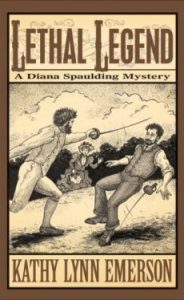 Kaitlyn Dunnett/Kathy Lynn Emerson here, today providing some follow up on a couple of my posts here at the Maine Crime Writers blog.
Kaitlyn Dunnett/Kathy Lynn Emerson here, today providing some follow up on a couple of my posts here at the Maine Crime Writers blog.
Back in October, in Books, You Say I wrote about being overwhelmed by the number of author copies of backlist books I’ve accumulated. I asked for suggestions and many of you responded to offer some excellent ideas. I’ve been a little slow to put them into practice, but I thought I’d share how one of them is going.
To start the new year off right, I sent an email to the fourteen public libraries closest to my house. I introduced myself and included a list of the titles that I have available to give away. To tell you the truth, I was a little disappointed in the response. Of those fourteen, only six replied.

Wilton Library
On the other hand, all six have taken me up on my offer. They checked their shelves and got back to me with the titles they were missing and I’ve been slowly but surely delivering them, something that has the added benefit of giving me a chance to meet the librarians in person. In addition, two of them have offered to use their book mailing system to send copies of my books to libraries farther afield. Since I do intend to branch out, making the same offer to other libraries around the state, this is especially welcome. Let’s face it, postage can get expensive, even with media mail, and when you drive more than twenty miles one way, the cost of gas can become an issue, too. The next round of emails will go out shortly to libraries I’ve visited to do Sisters in Crime panels and other events. Any Maine librarians reading this, feel free to leave a comment with your contact information and I’ll make sure you receive that email, too.

See those blue benches? I’d have guessed wrong and said there were chairs.
Another recent blog (Coming up Short) appeared earlier this month and concerned my current work-in-progress, the first book in a new cozy series set in rural New York state and featuring an amateur detective who is in her late sixties. I was lamenting the fact that, although I was happy with the draft I’d just finished (number two out of the four or five revisions before it’s turned in to my editor), it is 12.000 words short of the minimum required by my contract. I asked for feedback as to what additional material readers like to see in a cozy and what they consider unnecessary padding. I also mentioned that I did have one idea for a humorous scene where my character, Mikki Lincoln, who has moved to New York from Maine, visits the DMV to get a new driver’s license.
The manuscript is still “resting” while I’ve been working on a different project, but there have been two developments. First, my editor emailed to ask if I was wedded to the title Deadly Edits for this book in which the sleuth works as a book doctor to eke out her retirement income. That led to some very funny three-way exchanges (me, my editor, and my agent) full of title suggestions tied to the character’s profession. In the end, we all agreed on the best one: Crime and Punctuation.
The other development has to do with the DMV scene. I made up the home town Mikki returns to after fifty years away, but it is located in the real Sullivan County. As someone with a reputation for doing her research, that meant I needed to know what the real DMV office looks like and what procedures Mikki has to follow to get her driver’s license. Only some of that research can be done online. Fortunately, I still have high school friends in the area, one of whom lives right there in Monticello, where the local DMV office is located in the Sullivan County Government Center. I emailed to ask some questions. She responded by going undercover for me and taking a whole series of photographs to show me the route to the DMV offices and what they look like inside. She got some suspicious looks, and had to take a number, but no one complained, and now I can get the details right. I especially like the shot below with what looks like a child-sized desk under the learners’ permit sign.

Early next month, I start the next revision. Stay tuned for updates.

Kathy Lynn Emerson/Kaitlyn Dunnett is the author of over fifty books written under several names. She won the Agatha Award for best mystery nonfiction of 2008 for How to Write Killer Historical Mysteries and was an Agatha Award finalist in 2015 in the best mystery short story category for “The Blessing Witch.” Currently she writes the contemporary Liss MacCrimmon Mysteries (Kilt at the Highland Games) as Kaitlyn and the historical Mistress Jaffrey Mysteries (Murder in a Cornish Alehouse ~ UK in December 2016; US in April 2017) as Kathy. The latter series is a spin-off from her earlier “Face Down” series and is set in Elizabethan England. Her websites are www.KaitlynDunnett.com and www.KathyLynnEmerson.com
January 29, 2017
Running Away from January
Kate Flora here, filling in for Dorothy who is nursing a terrible, brain-crushing cold caught from her beloved grandchildren.

Sign in a store window. Dangerous allure to a shoe junkie.
I used to go crazy in February. Short-tempered, unfocused, chocolate-gobbling crazy. This was before people knew they suffered from SAD, or seasonal affect disorder. Indeed, being from New England, the very idea that being unable to endure winter was a disorder was unthinkable. The only proper solution was endurance. With children in school, getting away was out of the question, except for an occasional quick school vacation trip to warmer climes. Far too often, those escapes were truncated by bad weather and flight cancellations.
But years have passed, and the children have grown up and left home. It is no longer necessary to be in New England during the long, dark months of January, February, and March and I have beaten back the guilt that required so much endurance. So about eight years ago, when my husband started working half time, we started escaping to the West Coast in January. This year that took the form of hiking in Sedona, Arizona, visiting the left coast child in LA, and then heading up to San Francisco to visit with old friends.
Also, this year, for the first time in many years, I did not have a book deadline and left my laptop behind. Instead, I did a different kind of work.
Julia Cameron, in her book, The Artist’s Way, talks about the importance of having dates with oneself to refill the creative well. As described on juliacameronlive.com, these are “a once-weekly, festive, solo expedition to explore something that interest you. The Artist Date need not be overtly “artistic”–think mischief more than mastery, Artist dates fire up the imagination. They spark whimsey. They encourage play. Since art is about the play of ideas, they feed our creative work by replenishing our inner well of images and inspiration. When choosing an Artist Date, it is good to ask yourself, “what sounds fun”–and then allow yourself to try it.”
It is not part of my New England upbringing to have fun, but I’m working on it. So this January, while I’ve been on the road, I’ve been having dates with myself and playing with my camera. These photographs illustrate some of the ways I’ve been having fun observing new places.
And, dear readers, what do you do to refill the well?
Trees:

Ancient oak on the road from Sonoma to Napa

The twisted red trunks of manzanita

Tree trunk that looks like an animal head. Sedona

Moss covered trunk seen on a hike in wine country
Signs:

Cute sign in a restaurant in Silver Lake

Window in St. Helena

Sign in a winery window, Healdsburg, CA
Food:

Panna cotta with gingered pear

Avocado toast, Little Pine restaurant

Vegan sushi, Los Angeles
Whimsey:

Dried grasses in a bucket outside a restaurant in San Francisco that look way too much like you know who’s hair

Wallpaper that looks to a crime writer like blood spatter

Mirrored bathroom in a house outside LA. Can you imagine showering here?


